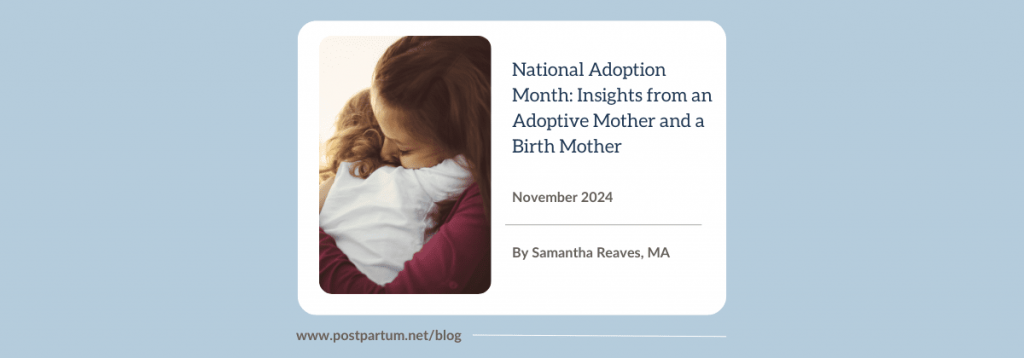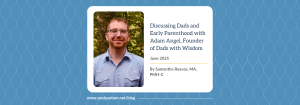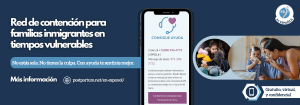By Samantha Reaves, MA
Insights from an Adoptive Mother: Megan
In April of 2017, I reluctantly had a second biological child. After my first child in 2014, I had severe postpartum anxiety and did not know if I could go through the same battle again. This time, I had a plan and an amazing team on board, and my postpartum period looked very different with my second child.
However, things still didn’t go as planned.
In July of 2017, my husband and I got a call from a social worker that a family member’s newborn baby was in the NICU and needed someone to make medical decisions. We were being asked to become a kinship placement. I thought my husband would say “no” to caring for a second baby along with our toddler, but he quickly replied “Well, we already have all the baby things out,” so we suddenly had three children in our care.
We met Lucas a month into his two-month NICU stay. His health was still touch and go, and we were thrown into making many decisions for this tiny baby who was all smiles. I’d never been in a NICU before this time, and the beeping machines, constant interruptions, and other medically fragile babies all around us kept me on hyper-alert. It was an intense and exhausting time.
Lucas came home with us in August of 2017. Suddenly, we needed a minivan! We didn’t know if Lucas would stay permanently with our family. We didn’t know what to wish for either. We did not want him to lose his family of origin; we just wanted what was best for him. It was complicated.
The many years of living in between, in a gray area of caregiving for him yet not knowing for how long, taught us daily lessons in staying present and focusing on only what we could control. Our mantra became “All we can do is love him today.” In 2019, we filed for adoption. Then the pandemic hit in March of 2020. Our adoption did not become official until March of 2022.
It has been a journey, full of challenging systems to navigate, so much paperwork, heartbreak, joy, patience, and holding our breath. We are so thankful to our parents, family, & friends who supported us during this tumultuous process. While we held Lucas, others held us, and it made all the difference.
We never want anyone to think we believe adoption is only positive or that we somehow saved Lucas. Adoption is a trauma for many adoptees. Adoption is complex. Losing your family of origin is never easy or simple. We do not know how Lucas will tell the story of his adoption, and what he will feel like about being adopted as he gets older. But we do know that he has been a gift to our family, that we are the luckiest to have him in our home, and we will support him as he navigates his own story. Lucas is now 7, and he sees his birth mom regularly; we will continue to foster that relationship. He deserves all the love, in all the ways possible.
Insights from a Birth Mother: Maureen
My biggest message to birthmothers is: you deserve to live again, have dreams, be happy, find love, laugh, and live a good life. So many birth moms feel so much shame and guilt and we punish ourselves.
I always want birth mothers to know that their experience of relinquishing their baby is a trauma; I didn’t know it until I was pregnant with my son 12 years after placing my daughter for adoption. I thought I had dealt with the adoption and cried and healed, but I shoved so many feelings down and had no clue what was hidden inside until my second pregnancy.
Getting support on your birth journey is so important and this support may come during different periods of your life, not only that first year postpartum.
Find the right help. Not all therapists are the same. Finding a therapist who is experienced in working with birth mothers is really important. They know how to guide and help you heal.
Birth mom groups are so important. It’s not like you walk around with a sign saying, “I am a birth mom, I am a birth mom!” In our PSI group, it is the first time many birth moms have met another birth mom. Sharing our stories is healing, and lets others know they are not alone. It makes the journey feel less lonely. I am so grateful to PSI for giving us the space for this group.
Our group is so special, we have a birth mom who joined 40 years after she placed and the first time she shared her story publicly was in our group. She always says to the birth moms who are in the group who recently placed, “I am so happy you have found each other so early on your journey.”
It’s really hard, it’s a loss that you chose. And many birth moms have to hold to the story that they just weren’t or aren’t enough.
I knew there was a loss of my baby, but there was a loss of parenting I had no clue that I would feel. I also experienced a different kind of loss as my daughter became an adult. It’s been a never-ending journey of phases of grief.
Understanding the different types of grief recently was very helpful for me. Learning about ambiguous grief and complicated grief helped me to understand everything I have felt and still feel.
There is a duality that is very unique to being a birth mother. So many moms feel so much love and joy for their babies. They are so proud of them and feel happy for the family they helped make, but in the same breath, there is such a deep hole of loss that feels like it could swallow you whole. Learning to hold both of these at the same time has been a lifelong journey.
There are amazing organizations out there. One that I love is On Your Feet Foundation. They provide case management, groups, advocacy, healing retreats for both moms at every stage of their journey, and skilled therapists. There are now podcasts, journals, and so many books on this subject.
You will feel better and more whole one day. It will always be there, that is what I have seen and experienced. Some 28 years after placing my daughter the pain is not as intense. And if you choose to have kids again, it’s ok. You deserve to be a mom again.
Maureen and her daughter, Mary Margaret, over the years.
Resources for Adoptive and Birth Mothers
Connect with a Specialized Coordinator for Adoptive Parents
Learn More About Perinatal Mental Health Disorders
Get Help












